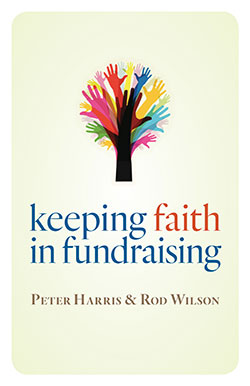Keeping Faith in Fundraising leaves readers with more questions than answers.
That’s its aim. Peter Harris and Rod Wilson set out to stimulate thinking and conversation about aspects of Christian fundraising often left undiscussed, and they succeed at their task.
 |
| Keeping Faith in Fundraising by Peter Harris and Rod Wilson (Eerdmans, 2017, 164 pp., $15). |
Looking for a “how-to” book with best practices for Christian fundraisers? Search elsewhere. Want scholarly research on this topic? I can recommend other titles. But if you want a book to challenge you to think deeply about “why” you do what you do in Christian fundraising, then this is the book for you!
The authors use the language of “journeying” to invite readers to reflect “on what it means to be not just a fundraiser but a truly Christian fundraiser” (p. 11). To accomplish this, they start by mining 2 Corinthians 8–9, which recounts Paul’s first-century fundraising campaign. From that text, they highlight seven themes: integration, people, work, success, need, method, and money.
The heart of the book considers these seven themes more closely. On integration, Harris and Wilson say that “what we do with our money and how we understand God and his work in the world are seamlessly woven together” (p. 22). About people, they remind readers that “fundraising is not simply a transfer of funds but a personal and relational exchange” (p. 23). Regarding work, they point out that “Paul as fundraiser sees himself doing God’s work” (p. 25). I appreciate how they challenge me to broaden my perspective beyond seeing fundraising as getting money.
With regard to success, the authors scrutinize Paul’s practices, concluding that they have “little to do with money” (p. 30). This is refreshing, because while success is often measured simplistically in terms of financial results, in the Scriptures Paul focuses on deeper spiritual objectives.
When discussing need, they get my attention with this profound question: “Is it too extreme to say that the calling of the donor to give and the spiritual impact of generosity on those who do so may have more significance in God’s economy than the need of the recipient?” (p. 31).
On method, they point out how Paul clearly and directly engages participation. Lastly, related to money, they astutely note that while the two chapters are all about money, Paul never uses the word “money” but uses language such as “service,” “act of grace,” “grace of giving,” “gift,” and “offering” to help the Corinthians (and us) realize that Christian fundraising is about more than money (p. 34).
At this point in the book Harris and Wilson direct readers to explore the implications of the seven themes. Each of the seven sections starts with a “guiding question” to challenge readers to think. For example, they ask: “In our work of raising funds, do we see people as being of much more value than the money they provide?” (p. 46). They don’t beat around the bush!
Here is another example: “Does an overemphasis on techniques in fundraising blind us to the reality that both askers and givers need to pay careful attention to the call of God in the process?” (p. 69). With these pointed questions, they prod readers to consider their own practices.
The book concludes with each of the two authors sharing stories of how they have personally grappled with the seven themes. At times, I felt myself wanting them to suggest specific steps to take or to avoid, but they stayed true to their aim of making me reflect.
I commend this book not because it has all the answers, but because it puts forth themes and questions in a readable and constructive fashion. Read it if you want to keep faith in fundraising!